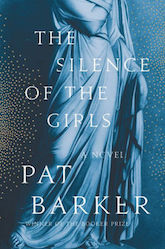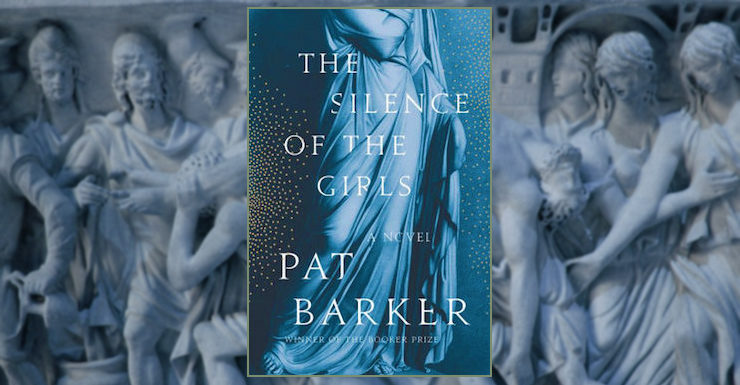Briseis of Lyrnessus is the teenage queen taken as Achilles’ trophy when his army destroys her town on their way to Troy, after he murders every male in her family—her husband, her father, her brothers, all brutally murdered in front of her. Every women is taken by the army and later distributed amongst the soldiers as spoils of war, with Briseis being given to Achilles, to whom she is expected to submit in every way. Later, there is an argument between Agamemnon and Achilles, which ends with Briseis being taken by Agamemnon as part of his winnings. Women, Pat Barker makes it clear in her new novel The Silence of the Girls, are nothing more than things men use to wield their power.
There have recently been a couple of books about Ancient Greek history written from a female point of view—Madeline Miller’s Circe, and now Barker’s The Silence of the Girls. Circe, which chronicles the life of its titular character, is very much about the gods and their egos. The Silence of the Girls, however, is very much about humans, their egos and their wars—both personal and political. The dirt and filth and disease and sheer brutal physicality of the Greek army marauding everything that stands in their way to Troy is very much Barker’s concern—there’s no magic here to ease the pain and trauma of rape or murder or even to help exact revenge. And while Achilles’ divine mother makes an appearance, and Apollo is beckoned by Briseis to bring about a plague, the gods remain on the peripheries of this story. There is no god in the machine to sort out situations with a thunderbolt here. There are only mortals, with all their flaws and ferocity and foolishness.
Mortal women in the Greek tales were rarely more than a wailing chorus or a beautiful body to be stolen away or fought over. The ones who survived were barely given a voice at all—something Pat Barker decides to challenge entirely in her take on The Iliad. We hear the women’s voices as they grieve, as they struggle, as they strive to live in whatever circumstances this war of men has forced upon them. Briseis and the other women the Greek army has collected are used as sex slaves, nurses, cleaners, cooks—it almost doesn’t matter what as, just that they are used endlessly by the very men who destroyed their families and homes, and that there is no way out for them. They are told repeatedly to remain silent, to submit to whatever comes their way because fighting against the inevitable rape and violence is futile. “And I do what countless women before me have been forced to do,” Briseis says, “I spread my legs for the man who killed my husband and my brothers.”
Not just are these women the trophies of war, their bodies traded back and forth, nothing more than economics, but they are also sometimes named as the causes of wars and arguments. Helen, secreted away as Troy falls to pieces, is said to be the cause for this great war—but is she really? Briseis, with no agency of her own, who becomes the cause for Achilles to refuse Agamemnon’s help and almost lose the war—she isn’t to blame for what the men around her use her to prove. Men’s egos are the cause for war; women are simply an excuse, maybe a catalyst at the most, but only one that is used by men to assuage their own fragile sense of masculinity and heroism.
Heroic behaviour, something the greatest of the Greeks are known for, isn’t anything admirable when viewed from the lens of the women they abuse. The “butcher” is what the women called Achilles, known by his men and historians as the great, the brilliant, the godlike. Even Patroclus, Achilles’ closest friend and right hand man in the war, who is the best of the men and may treat the women (especially Briseis) better than the other men do, cannot challenge the existing system—he’s just as much enmeshed in the terribly violent patriarchal culture of his time as the rest.
Buy the Book


The Silence of the Girls
While most of the narrative is told from Briseis’ point of view, Barker switches to Achilles as the story hurtles towards the end of the Trojan war. The great hero himself has moments where we see him not just as the butcher, but as a poet, a musician, a lover, a friend—for all his brutality, he too is a man broken by war, unable to find a way to live otherwise. In his relationship with Patroclus, in his treatment of Priam who comes to beg for his son’s body back, in his desperate need for and fears of abandonment regarding his mother, in the bravado he puts on for his men, we see him to be a complicated man torn asunder by two very different parts of his nature: perhaps whom he is intrinsically, and the hero he is mean to be. Toxic masculinity, Barker shows us, has always, always existed.
This is as much The Iliad from a female lens as it is a story reminding us of the patriarchal nature of all of history—it isn’t just written by the conquerers, it is written by men. But Barker is adamant that this must change. When Briseis is told to forget her past life, she immediately knows it is exactly what she must not, can not do: “So there was my duty laid out in front of me, as simple and clear as bowl of water: Remember.” She knows no one will want to record the reality of what went on during the war: “they won’t want the brutal reality of conquest and slavery. They won’t want to be told about the massacres of men and boys, the enslavement of women and girls. They won’t want to know we were living in a rape camp. No, they’ll go for something altogether softer. A love story, perhaps?” But even so, Briseis, for all that she must bear, understands eventually that the women will leave behind a legacy, though not in the same vocal, violent way the men will.
“We’re going to survive,” she says, “our songs, our stories. They’ll never be able to forget us. Decades after the last man who fought at Tory is dead, their sons will remember the songs their Trojan mothers sang to them. We’ll be in their dreams—and in their worst nightmares too.”
The Silence of the Girls is available from Doubleday.
Mahvesh loves dystopian fiction & appropriately lives in Karachi, Pakistan. She writes about stories & interviews writers the Tor.com podcast Midnight in Karachi when not wasting much too much time on Twitter.











There is an interesting dimension to this women as prizes of war. The women aren’t blamed or shamed in the early myths.. Unlike later Pagan and Christian heroes who condemned women for submitting and saving their lives Heroic Age Greeks didn’t expect women to die to protect their ‘virtue’. Briseis is taken from Achilles after Agamemnon loses his pet concubine Chryseis being forced to surrender her to her father by his allies (Chryses being a priest of Apollo and backed by his god). The thing is Chryses still wants his daughter back even though he knows she’s been used by Agamemnon. And once rescued Chryseis remains respectable and marriagable with a Prince of Troy no less as her chief suitor.
When Helen is retaken she resumes her position as Menelaus’ wife and Queen of Sparta. Nothing that happened between her and Paris is held against her. Later Greeks had a real problem with that and invented all kinds of ‘appropriate’ punishments for Helen. Punishments for being as this article says used as a thing.
I was surprised when I read The Iliad at how much of a voice women still have in the original epic, even while it focuses on men and presents women as primarily extensions of men’s honor. Helen is a fascinating character in the original – fed up with Paris, mournful, angry at Aphrodite, calling herself “vicious” and a “whore” and finding a place as a friend of Hector and Priam…She is by no means the flat one-dimensional female character I expected from what I’d heard about gender roles in ancient Greek society. That’s still just crumbs compared to the rich character development of some of the leading men. But I was pleasantly surprised and suddenly tempted to write fanfic.
Briseis also has a lot to say for herself, she describes how Achilles and the Greeks destroyed her life, and how Patroculus comforted her and helped her build a new life with Achilles, who promised her marriage. Briseis was a survivor, all the women in the Illiad are. They don’t just submit they work to remake their lives. Briseis may not love Achilles but he can give her back her rank and prestige and even more. She sees opportunity and she goes for it. Unromantic, unsentimental but in my opinion very brave.
@2 It’s worth remembering that the Iliad dates from the Greek “Dark Age”, some 200 or 300 years before the Classical era – so it’s not all that surprising that some of its ideas about gender roles aren’t as restrictive as Classical Greek ones. The same is seen in other very early Greek works.
Mortal women in the Greek tales were rarely more than a wailing chorus or a beautiful body to be stolen away or fought over. The ones who survived were barely given a voice at all
If you think this, you’ve missed out on some of the great female characters of literature. Antigone! Clytemnaestra! Electra!
The “butcher” is what the women called Achilles, known by his men and historians as the great, the brilliant, the godlike.
Not so. Achilles’ name itself means “he who distresses the people”. The very first lines of the Iliad are “Sing, Gods, of the rage of Peleus’ son Achilles, which brought so much grief to his fellow Greeks”. And he isn’t called “brilliant”; that’s Agamemnon. He’s known most often as “swift-footed” but also as “the destroyer of men”. (Godlike is simply an accurate description; he’s the son of the immortal Thetis, therefore half-divine).